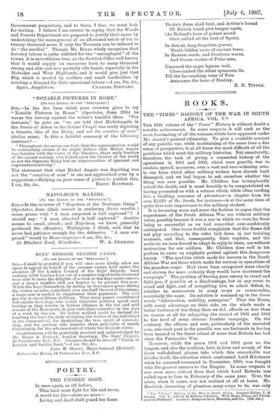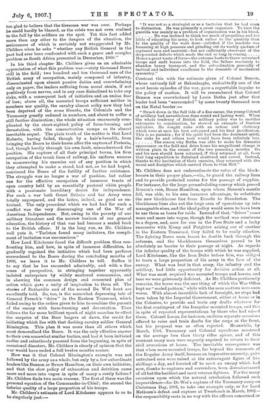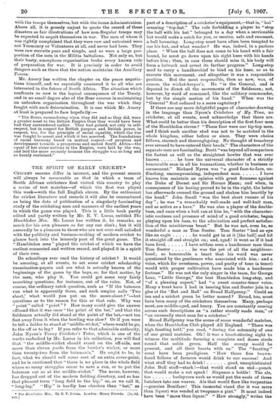BOOKS.
THE " TIMES " HISTORY OF THE WAR IN SOUTH AFRICA, VOL. V.* THE fifth volume of the " Times " History is without doubt a notable achievement. In some respects it will rank as the most fascinating of all the volumes which have appeared under Mr. Amery's general editorship. To give a readable account of any guerilla war, while maintaining at the same time a due sense of perspective, is at all times the most difficult of all the problems which meet the military historian. Not unnaturally, therefore, the task of giving a connected history of the operations in 1901 and 1902, which were guerilla war in excelsis, spread, moreover, over a vast and ever-widening area, is one from which other military writers have shrunk back dismayed, and we had begun to ask ourselves whether the thing was ever possible. Mr. Childers has triumphantly solved the doubt, and is most heartily to be congratulated on having presented us with a volume which, while often reading like a thrilling romance of adventure—a chapter from his own Biddle of the Sands, for instance—is at the same time of quite first-rate importance to the military student.
It is becoming more and more the fashion to argue that the experiences of the South African War are without military value, possibly because it was a war in which we were far from being so successful as we had somewhat over-confidently anticipated. One hears fretful complaints that the Boers did not play according to the rules laid down in our training manuals, and that, consequently, their exploits, and the methods we were forced to adopt to reply to them, are without instruction for our soldiers. Mr. Childers does well in his preface to enter an emphatic protest against this dangerous heresy. "The qualities which made for success in the South African War are those which make for success in operations of the grandest scope. Had these been recognised more clearly and striven for more ardently they would have shortened the campaign." The problem of forcing your enemy to stand and fight you, if possible at a disadvantage, but in any event to stand and fight, and of compelling him to admit defeat, is, whether he manceuvres in army corps or commandos, essentially the same. Its solution is summed up in the three words "information, mobility, enterprise." That the Boers, with every advantage on their side, on the whole made a better business of the thing than we did, affords us less than no reason at all for relegating the record of 1901 and 1902 to the level of some obscure frontier campaign. On the contrary, the officers and men, particularly of the mounted arm, who took part in the guerilla war are fortunate in having been trained in the finest school of arms that Britain has had since the Peninsular War.
Moreover, while the years 1901 and 1902 gave us the longest, and also the costliest, both in lives and money, of the three well-defined phases into which this remarkable war divides itself, the situation which confronted Lord Kitchener when he assumed command in November, 1900, was fraught with the gravest menace to the Empire. In some respects it was even more critical than that which Lord Roberts was called upon to face in February of the same year. True, the crisis, when it came, was not realised at all at home. Mr. Brodrick, dreamimg of phantom army corps to be, was only
• The "Times" History of the War in South Africa. General Editor, L. S. Amery. Vol. V., Edited by Erskine Childers. With Naps, Plans, and Photo. gravure Portraits. London ; Sampson Low, Marston, and Co. [21n. net.]
too glad to believe that the tiresome war was over. Perhaps he could hardly be blamed, as the crisis was not even realised to the full by the soldiers on the spot. Yet this fact added more than any other to the dangers of the situation, the seriousness of which is certainly not exaggerated by Mr.
Childers when he asks "whether any British General in the past had ever been confronted with such a grave and complex problem as South Africa presented in December, 1900."
In his third chapter Mr. Childers gives us an admirable appreciation of what this problem was :—sixty thousand Boers still in the field ; two hundred and ten thousand men of the British army of occupation, mainly composed of infantry, disseminated upon almost passive duties and overwhelming only on paper, the leaders suffering from moral strain, if not positively from nerves, and in any case disinclined to take any risks, with a consequent lack of initiative and an undue fear of loss; above all, the mounted troops sufficient neither in numbers nor quality, the cavalry almost sulky now they had been deprived of the arrne blanche, the Colonials and the Yeomanry greatly reduced in numbers, and about to suffer a still further diminution ; the whole situation enormously com- plicated by the short-sighted; policy of farm-burning and devastation, with the concentration camps as its almost inevitable sequel. The plain truth of the matter is that Lord Roberts, having failed, though by a hair's-breadth, from bringing the Boers to their knees after the capture of Pretoria, bad, though hardly through his own fault, misunderstood the position. His capture of all their principal towns, his firm occupation of the trunk lines of railway, his uniform success in manceuvring his enemies out of any position in which they attempted to make a stand, had not, as he had hoped, convinced the Boers of the futility of further resistance. The struggle was no longer a war of position, but rather one for the effective occupation of immense tracts of open country held by an essentially pastoral white people with a passionate hereditary desire for independence. For such a war both Great Britain and her Army were totally unprepared, and the latter, indeed, as good as un- trained. The only precedent which we had had for such a conflict was the very discouraging one of the War of American Independence. But, owing to the poverty of our military literature and the narrow horizon of our general education, the history of that war had become a sealed book to the British officer. If in the long run, as Mr. Childers well puts it, " Tarleton found many imitators, the compli- ment of imitation was unconscious."
How Lord Kitchener faced the difficult problem thus con- fronting him, and how, in spite of immense difficulties, be gradually regained the initiative which had been perforce surrendered to the Boers during the concluding mouths of 1900, we leave it to Mr. Childers to tell. Suffice it to say that he has succeeded admirably, and with a fine sense of perspective, in stringing together apparently isolated enterprises by widely scattered commandos, and in showing the common design and concerted plan of action which gave a unity of inspiration to them all. The stories of Bothaville and of the second De Wet bunt are excellently told. So, too, is the somewhat depressing tale of General French's "drive" in the Eastern Transvaal, which failed owing to the orders given to him to combine the pursuit of the enemy with farm-burning and devastation. Then follows the far more brilliant epoch of night marches to effect the surprise of the Boer laagers at dawn, the credit for initiating which lies with that dashing cavalry soldier General Rimington. This plan it was more than all others which most demoralised the Boers. It was the only effective answer to their own somewhat similar tactics, and had it been initiated earlier and relentlessly pursued from the beginning, in spite of occasional disasters, Mr. Childers is clearly of opinion that the war would have ended a full twelve months sooner.
How was it that Colonel Rimington's example was not followed by the army as a whole, but only by a few subordinate leaders like Benson or Bruce Hamilton, on their own initiative, and that the slow policy of 'exhaustion and detrition came more and more into vogue in spite of many a costly failure ? Mr. Childers finds two main reasons. The first of these was the personal equation of the Commander-in-Chief ; the second the inferior quality of a large proportion of his troops.
Mr. Childers's estimate of Lord Kitchener appears to us to be singularly just:—
"It was not as a strategist or as a tactician that he had risen to distinction. He was primarily a great organizer. To view the guerilla war mainly as a problem of organization was in his blood.
He was inclined to think too much of propelling and too little of educating his army, to look rather to the quantity than to the quality of the work done—satisfied if the machine was humming at high pressure and grinding out its weekly quotum of captured men and material—but not sufficiently observant of the deep-rooted defects which made the end so long in coming Hence a great waste of force—the extreme haste to throw untrained troops and unfit horses into the field, the failure resolutely to abandon heavy transport, and the subordination generally of tactical and individual excellence to the demands of mechanical symmetry."
Contrast this with the estimate given of Colonel Benson, whose untimely fall at Bakenlaagte, undoubtedly one of the most heroic episodes of the war, gave a regrettable impulse to
the policy of caution. It will be remembered that Colonel Benson was overwhelmed by Louis Botha just after that leader had been " surrounded " by some twenty thousand men on the Natal border :—
" Struck down in the full tide of a fine career, the young Colonel of artillery had nevertheless done sound and lasting work. When the whole tendency of British military policy was to sacrifice enterprise to organization, he showed an example of fearless initiative. He sought risks with an ardour and obstinacy which were at once his best safeguard and his final justification. This is no paradox ; for if his spirit had been the dominant spirit, the risks he and others took would have been infinitely less.
The reason why Botha was able to make his dramatic appearance on the field and drive home his magnificent charge is written plain in the events of the two preceding months. Ho and his men should have returned, if they returned at all, from that long expedition to Zululand shattered and cowed. Instead, thanks to the hesitation of their enemies, they returned with the moral and discipline which carried them to Gun Hill."
Mr. Childers does not underestimate the value of the block- houses in their proper place,—viz., to guard the railway lines and to provide protected routes for the passage of supplies. For instance, for the huge perambulating convoy which proved Benson's ruin, Bruce Hamilton, upon whom Benson's mantle fell, was able, to his own immense advantage, to substitute the new blockhouse line from Ermelo to Standerton. The blockhouse lines also cut the huge area of operations up into manageable sizes, and the ideal policy would seem to have been to use them as bases for raids. Instead of that, "drives" came more and more into vogue, though the method was cumbrous to a degree, and, save for one in the Free State and a lucky encounter with Kemp and Potgieter arising out of another in the Eastern Transvaal, they failed to be really effective. The fighting Boers soon learnt to double back through the columns, and the blockhouses themselves proved to be absolutely no barrier to their passage at night. As regards the inferior quality of the troops with which be was supplied, Lord Kitchener, like the Iron Duke before him, was obliged to train a large proportion of his army in the face of the enemy. What was best in that army, the infantry and the artillery, had little opportunity for decisive action at all.
What was most required was mounted troops and horses, and here we were grievously deficient. As Mr. Childers pertinently remarks, the horse was the one thing of which the War Office kept no "sealed pattern," while with the men matters were even worse. With almost incredible lack of foresight, no steps had
been taken by the Imperial Government, either at home or in the Colonies, to provide and train any drafts whatever for the first contingent of the Irregular mounted troops, and this in spite of repeated representations by those who had raised them. Colonel Lucas, for instance, on three separate occasions offered to raise and train drafts for the corps at the front, but his proposal was as often rejected. Meanwhile, by March, 1901, Yeomanry and Colonial squadrons mustered on the average less than thirty rifles apiece, and of this remnant many men were urgently required to return to their civil avocations at home. The inevitable consequence was that when more mounted troops, far beyond the resources of
the Regular Army itself, became an imperative necessity, quite untrained men were raised at the extravagant figure of five
shillings a day, and hurried off to meet an enemy which bad now, thanks to captures and surrenders, been disembarrassed of all but the hardiest and most veteran fighters. For the many occasions upon which the natural retribution followed such
improvidence—for De Wet's capture of the Yeomanry camp on Christmas Day, 1901, to take one example only, or for Lord Methuen's defeat and capture at Tsveebosch in March, 1902—
the responsibility rests in no way with the officers concerned or
with the troops themselves, but with the home Administration. Above all, it is grossly unjust to quote the record of these
disasters as fair illustrations of how non-Regular troops may be expected to acquit themselves in war. The men of whom it was rightly complained that they were raw and untrained were not Yeomanry or Volunteers at all, and never had been. They were raw recruits pure and simple, and so were a large pro- portion of the men in the Militia battalions. Not only so, but their hasty, amorphous organisation broke every known rule of preparation for war. It is precisely in order to avoid dangers such as these that the nation maintains the Auxiliary Forces.
Mr. Amery has written the chapter on the peace negotia- tions himself, and we especially commend it to all who are interested in the future of South Africa. The situation which confronts us now is the logical consequence of the Treaty, and in no small degree also of the Boer success in maintaining an unbroken organisation throughout the war which they fought with such determination. It is one which Mr. Amery at least is prepared to face hopefully :—
" The Boers, surrendering when they did and as they did, were a greater asset to the British Empire than they would have been had they surrendered earlier. They had gained, not only in self- respect, but in respect for British purpose and British power, in respect, too, for the principle of racial equality, which the war was fought to assert and which it has asserted. The foundations of racial harmony based on mutual respect—of progress and development towards a prosperous and united South Africa—the equal of her sister nations in the Empire, were laid by the war, and laid the more securely because the struggle was so long and so keenly sustained."
















































 Previous page
Previous page